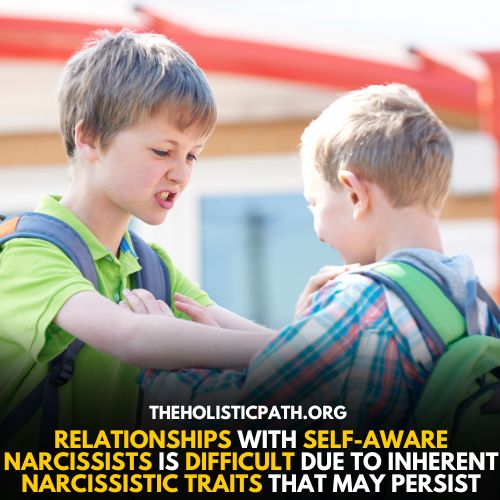Narcissism, often marked by excessive self-admiration and grandiose self-importance, comes in various shades of intensity. When combined with self-awareness, it creates a distinctive phenomenon known as the self-aware narcissist.
Unlike conventional narcissists who might remain oblivious to their harmful traits, self-aware narcissists have a keen insight into their actions and how they affect those around them. This article explores the distinctive hazards of self-aware narcissism, revealing the psychological, emotional, and interpersonal challenges linked to this intricate personality trait.
Inside the Mind of a Self-Aware Narcissist: A Deeper Look
Imagine someone who’s not just your regular narcissist but a self-aware one. What sets them apart is their exceptional talent for spotting their narcissistic traits and using them to their advantage. It’s like they’ve cracked the code of power dynamics in relationships and are master manipulators.
Self-aware narcissists are driven by an insatiable hunger for validation and admiration. They have this magnetic charisma that they expertly wield to maintain control over everyone around them. They’re the center of their universe, and they don’t mind putting their needs above everyone else’s.
One of the saddest parts is their lack of empathy.
They find it incredibly tough to connect with others on a deep, emotional level. To them, relationships are simply tools to serve their own purposes. This selfish outlook damages their connections, leaving them devoid of trust, true intimacy, and mutual respect.
Limited Positivity of Self-Aware Narcissism
Self-awareness in narcissists can offer a limited positive outlook amidst their predominant self-centeredness:
- Understanding Their Behavior: Some self-aware narcissists might recognize their behavior and its impact on others, prompting a slight improvement in their interactions.
- Initiating Change: This awareness could lead them to seek therapy or self-help resources to work on their behaviors and attempt to cultivate more genuine connections.
- Utilizing Self-Centered Traits Positively: Certain narcissists might use their self-awareness to direct their charisma, confidence, and ambition into productive avenues, leading to achievements in their professional endeavors.
However, it’s essential to note that while a narcissist may display moments of self-awareness, it might not always translate into sustained behavioral change or empathy towards others. Their primary focus tends to remain on themselves, and any efforts to change are often to serve their self-interest rather than for the benefit of those around them.
True empathy, which is crucial for fostering healthy relationships, might still be lacking despite a superficial understanding of their behavior.

What Triggers Self-Awareness in Narcissists?
Self-awareness in narcissists can be triggered by significant life events that shake their world. These events often act as a wake-up call, making them confront aspects of themselves they might have otherwise avoided. Such triggers could range from major life changes like a personal crisis, the loss of a loved one, a serious health issue, or even a turbulent breakup.
When faced with these stressful events, self-awareness can creep in because the usual coping mechanisms fail.
For instance, a divorce might force a narcissist to confront their behavior patterns that might have contributed to the breakdown of the relationship. Similarly, the death of a loved one might prompt them to reflect on their connections and the impact they’ve had on others.
These pivotal moments disrupt the narcissist’s carefully constructed self-image and might compel them to reassess their actions, behaviors, and their impact on the people around them. It’s a confronting experience that challenges their perception of themselves and their relationships, leading to a potential realization of their own narcissistic traits.
Can a Self-Aware Narcissist Change? 4 Things to Consider
Self-aware narcissists have the potential to change, but the extent and sustainability of that change can be quite challenging and often limited.
The self-awareness of a narcissist may create an opportunity for them to recognize their behavior and its impact on others.
This realization could prompt some to seek help, such as therapy or self-improvement strategies, in an attempt to modify their behaviors and cultivate more authentic connections. They might make conscious efforts to adapt their conduct and work on their relationships, acknowledging the need for change.
However, while change is possible, it’s crucial to understand the complexities involved:
-
Resistance to Change: Narcissistic traits, deeply ingrained over time, often pose a significant obstacle to change. Their fundamental belief in their superiority and entitlement can make it difficult for them to relinquish their self-centered behaviors willingly.
-
Superficial Changes: Even when they attempt to change, it might often be superficial. Some may alter their behavior for a short period, especially when under scrutiny, yet revert to their previous ways once the pressure diminishes.
-
Lack of Empathy: True empathy, essential for establishing meaningful relationships, is typically lacking in narcissists. Even with self-awareness, they may struggle to authentically connect with others on an emotional level.
-
Motivation for Change: Their motivation for change might primarily stem from self-interest rather than genuine concern for others. They might alter their behavior to attain personal goals or to improve their image rather than out of a sincere desire to foster healthy relationships.
5 Step Healing for Self-Aware Narcissists
Healing for a self-aware narcissist involves a multifaceted approach to address their narcissistic tendencies and foster personal growth. Here are the steps to healing for a self-aware narcissist:
1. Exploring the Roots of Narcissistic Tendencies
Understanding where narcissistic behavior comes from is like tracing back through a storybook of our lives. It’s about looking at the things that happened way back when we were young and even as we grew up. Sometimes, something in our past, like a tough time or feeling not good enough, might’ve led us down this path of self-centered behavior.
When we take a closer look at these moments, it helps us figure out why we act the way we do now.
Sometimes, it’s not just one thing that made us who we are, but a bunch of things piled up together. This understanding helps us see what triggers our behaviors and how they affect others. It’s like finding the first puzzle piece to figuring out the bigger picture of ourselves.
2. Cultivating Self-Awareness
Think of self-awareness as having a secret power – it’s about knowing and understanding our own actions and their impact on the people around us. It’s not easy to do, but it’s like turning on a light inside ourselves.
When we become more aware of why we act a certain way, it’s like unlocking the first door to changing how we behave.
Being aware of what’s going on in our heads is like taking a mirror and looking at our thoughts and actions. It’s about asking questions and being honest with ourselves. And when we can reflect on these things, it helps us take the next steps to becoming a better version of ourselves.

3. Adopting Healthier Coping Strategies
Sometimes when things get tough, we might act in ways that aren’t the best for us or the people around us. This step is all about finding better ways to handle tough times. It’s like building a toolbox with different tools to help us when things get hard.
Finding someone who can help, like a counselor or a therapist, is like having a guide to show us these new tools and how to use them. They can help us learn healthier ways to deal with stress or when things don’t go our way. It’s like learning new ways to handle tough feelings so they don’t make everything harder for us.
4. Fostering Empathy and Perspective-Taking
Empathy is like putting on someone else’s shoes and walking around. It’s about understanding how someone else feels, even if their feelings are different from ours. It’s hard to do, but when we try to understand others, it’s like building a bridge that connects us.
Perspective-taking is like trying on different pairs of glasses.
It’s about seeing things from different angles, not just our own. When we start to listen and understand how someone else might feel or see things, it helps us build better relationships. It’s like learning a new language that helps us communicate better with others.
5. Enhancing Self-Esteem and Self-Worth
Having good self-esteem is like having a cheerleader inside our heads. It’s about feeling good about who we are, not because someone else says so, but because we believe it. When we set goals and achieve them, it’s like scoring a goal in a game – it makes us feel good about ourselves.
Building self-worth is about understanding our value, like finding a treasure inside ourselves. It’s about not depending on others to feel good. When we see our worth from within, it’s like having a superpower that makes us strong even when things get tough.
7 Key Factors of Dating a Self-Aware Narcissist
Dating a self-aware narcissist can present a complex and challenging relationship dynamic. On one hand, the awareness of their narcissistic tendencies might mean they’re conscious of their behaviors and how they affect the relationship. This awareness could lead to moments of consideration and attempts to address some of the negative traits associated with narcissism.

However, despite this self-awareness, relationships with self-aware narcissists can remain difficult due to inherent narcissistic traits that may persist. Here are some challenges and dynamics of dating a self-aware narcissist:
-
Initial Charm: Self-aware narcissists can often be incredibly charming and charismatic, which may draw you to them initially. They might possess a level of self-confidence and assertiveness that can be alluring.
-
Manipulation: While they are aware of their narcissistic traits, self-aware narcissists may still engage in manipulation, albeit in a more calculated manner. They may use their awareness to control and influence situations to serve their interests.
-
Intermittent Self-Reflection: Self-aware narcissists might have moments of self-reflection and attempts to change their behavior, which can create hope for a better relationship. However, these moments are often short-lived, and they may revert to their old habits.
-
Emotional Roller Coaster: Dating a self-aware narcissist can be emotionally challenging. They may alternate between moments of empathy and understanding and moments of self-centeredness and manipulation. This can create confusion and instability in the relationship.
-
Communication Difficulties: Despite their self-awareness, self-aware narcissists may still struggle with effective communication and empathetic understanding of their feelings and needs. They may have difficulty genuinely connecting on an emotional level.
-
Focus on Self-Interest: Ultimately, self-aware narcissists still prioritize their own needs and desires. While they may make occasional efforts to consider your feelings, their primary focus remains on themselves and their validation.
-
Personal Growth Efforts: Some self-aware narcissists may genuinely attempt to improve themselves and their behavior. They might seek therapy or engage in self-help strategies to address their narcissistic tendencies. However, significant, lasting change is often challenging and not guaranteed.
Navigating a relationship with a self-aware narcissist requires significant patience and understanding. Communication, setting boundaries, and realistic expectations are crucial. It’s important for the partner of a self-aware narcissist to prioritize their well-being and seek support or counseling to manage the challenges that may arise in such relationships.
Ultimately, each situation is unique, and whether the relationship can be sustainable or not largely depends on the efforts and genuine commitment of both partners toward growth and understanding.
Takeaway
Understanding the self-aware narcissist illuminates a complex interplay between recognition and transformation. While their acknowledgment of narcissistic traits provides a glimmer of hope for change, the journey toward genuine transformation is intricate. Relationships with self-aware narcissists involve a delicate balance between occasional empathy and persistent self-centered behavior.
Recognizing this intricate dynamic is crucial.
Ultimately, navigating these relationships requires clear boundaries and realistic expectations. The self-aware narcissist’s journey underscores that while awareness is a starting point, sustained change demands ongoing dedication and support, highlighting the complexity of this unique aspect of human behavior.
Frequently Asked Questions
What happens when a narcissist realizes they can’t control you?
When a narcissist realizes they can’t control you, they may become frustrated, angry, or attempt to manipulate the situation further. This realization threatens their sense of power and superiority. They might employ different tactics such as guilt-tripping, gaslighting, or withdrawing affection. In extreme cases, they may discard or devalue the person who resists their control and seek someone else who they believe they can control.
At what age does a narcissist change?
Narcissistic personality traits typically manifest in late adolescence or early adulthood and are quite ingrained by the time an individual reaches their early 20s. While it’s challenging for a full-fledged narcissist to change, some may show improvement or a decrease in narcissistic behaviors with therapy or significant life events that prompt introspection. However, substantial change in a diagnosed narcissistic personality disorder is rare without professional intervention.
Can a narcissist love their child?
Narcissists can have complex relationships with their children. They might have genuine feelings of care and affection, but their self-centered nature often influences their interactions. Narcissistic parents might view their children as extensions of themselves, rather than as individuals with their own needs and desires. Their love might be conditional, and they can be emotionally manipulative or neglectful.
Can you unintentionally be a narcissist?
Yes, it’s possible to exhibit narcissistic traits without having a full-blown narcissistic personality disorder. Many people may display narcissistic behaviors without meeting the diagnostic criteria for the disorder. These behaviors could be a result of environmental factors, upbringing, or learned behaviors. Self-reflection and therapy can help individuals identify and address these traits.
How does a narcissist react to love?
Narcissists may have a superficial understanding of love. They might initially idealize their partner in a new relationship, showing intense passion and admiration. However, as the relationship progresses, they may struggle with genuine emotional intimacy and reciprocity. Their self-centered nature often leads to manipulation, control, and a lack of empathy in the relationship. They might also become easily threatened by their partner’s needs and withdraw affection or resort to manipulation tactics when they feel their control slipping.
